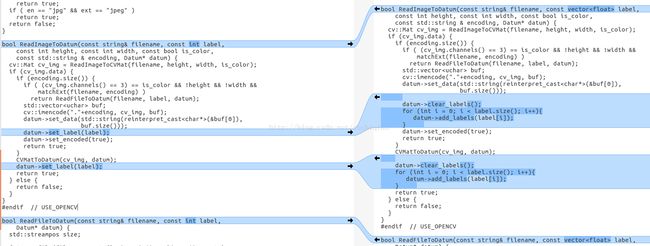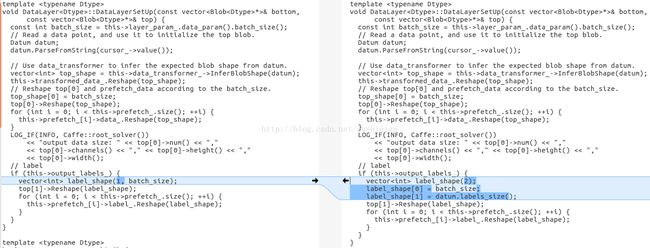Caffe 实现多标签分类 支持Multi-Label的LMDB数据格式输入
Caffe自带的图像转LMDB接口只支持单label,对于多label的任务,可以使用HDF5的格式,也可以通过修改caffe代码来实现, 我的文章Caffe 实现多标签分类 里介绍了怎么通过修改ImageDataLayer来实现Multilabel的任务, 本篇文章介绍怎么通过修改DataLayer来实现带Multilabel的LMDB格式数据输入的分类任务
1. 首先修改代码
修改下面的几个文件:
$CAFFE_ROOT/src/caffe/proto/caffe.proto
$CAFFE_ROOT/src/caffe/layers/data_layer.cpp
$CAFFE_ROOT/src/caffe/util/io.cpp
$CAFFE_ROOT/include/caffe/util/io.hpp
$CAFFE_ROOT/tools/convert_imageset.cpp
(1) 修改 caffe.proto
在 message Datum { }里添加用于容纳labels的一项
repeated float labels = 8;
如果你的Label只有int类型,可以用 repeated int32 labels = 8;
(2) 修改 data_layer.cpp
修改函数 DataLayerSetUp()
新的代码:
vector label_shape(2);
label_shape[0] = batch_size;
label_shape[1] = datum.labels_size(); 修改函数 load_batch()
新的代码:
int labelSize = datum.labels_size();
for(int i = 0; i < labelSize; i++){
top_label[item_id*labelSize + i] = datum.labels(i);
}(3) 修改 io.hpp
新的代码
bool ReadFileToDatum(const string& filename, const vector label, Datum* datum);
inline bool ReadFileToDatum(const string& filename, Datum* datum) {
return ReadFileToDatum(filename, vector(), datum);
}
bool ReadImageToDatum(const string& filename, const vector label,
const int height, const int width, const bool is_color,
const std::string & encoding, Datum* datum);
inline bool ReadImageToDatum(const string& filename, const vector label,
const int height, const int width, const bool is_color, Datum* datum) {
return ReadImageToDatum(filename, label, height, width, is_color,
"", datum);
}
inline bool ReadImageToDatum(const string& filename, const vector label,
const int height, const int width, Datum* datum) {
return ReadImageToDatum(filename, label, height, width, true, datum);
}
inline bool ReadImageToDatum(const string& filename, const vector label,
const bool is_color, Datum* datum) {
return ReadImageToDatum(filename, label, 0, 0, is_color, datum);
}
inline bool ReadImageToDatum(const string& filename, const vector label,
Datum* datum) {
return ReadImageToDatum(filename, label, 0, 0, true, datum);
}
inline bool ReadImageToDatum(const string& filename, const vector label,
const std::string & encoding, Datum* datum) {
return ReadImageToDatum(filename, label, 0, 0, true, encoding, datum);
}
代码修改前后,右边是修改后的代码
(4) 修改 io.cpp
修改函数 ReadImageToDatum()
修改后的代码
bool ReadImageToDatum(const string& filename, const vector label,
const int height, const int width, const bool is_color,
const std::string & encoding, Datum* datum) {
cv::Mat cv_img = ReadImageToCVMat(filename, height, width, is_color);
if (cv_img.data) {
if (encoding.size()) {
if ( (cv_img.channels() == 3) == is_color && !height && !width &&
matchExt(filename, encoding) )
return ReadFileToDatum(filename, label, datum);
std::vector buf;
cv::imencode("."+encoding, cv_img, buf);
datum->set_data(std::string(reinterpret_cast(&buf[0]),
buf.size()));
datum->clear_labels();
for (int i = 0; i < label.size(); i++){
datum->add_labels(label[i]);
}
datum->set_encoded(true);
return true;
}
CVMatToDatum(cv_img, datum);
datum->clear_labels();
for (int i = 0; i < label.size(); i++){
datum->add_labels(label[i]);
}
return true;
} else {
return false;
}
} 
修改函数 ReadFileToDatum()
修改后的代码
bool ReadFileToDatum(const string& filename, const vector label,
Datum* datum) {
std::streampos size;
fstream file(filename.c_str(), ios::in|ios::binary|ios::ate);
if (file.is_open()) {
size = file.tellg();
std::string buffer(size, ' ');
file.seekg(0, ios::beg);
file.read(&buffer[0], size);
file.close();
datum->set_data(buffer);
datum->clear_labels();
for (int i = 0; i < label.size(); i++){
datum->add_labels(label[i]);
}
datum->set_encoded(true);
return true;
} else {
return false;
}
}
(5) 修改 convert_imageset.cpp
修改部分新的代码
std::vector > > lines;
std::string line, filename;
float label;
while (std::getline(infile, line)) {
std::istringstream iss(line);
iss >> filename;
std::vector labels;
while(iss >> label) {
labels.push_back(label);
}
lines.push_back(std::make_pair(filename, labels));
} 2. 编译代码
mark@ubuntu:~/caffe/build$ make all
mark@ubuntu:~/caffe/build$ sudo make install
3. 生成LMDB文件
编译成功后,使用新生成的 convert_imageset 将训练所用的图片转换成LMDB文件
将训练所用图片转换为LMDB文件
mark@ubuntu:~/caffe$ sudo ./build/tools/convert_imageset -shuffle=true /home/mark/data/ /home/mark/data/train.txt ./examples/captcha/captcha_train_lmdb
/home/mark/data/ 是训练所用的图片所在的root目录
/home/mark/data/train.txt 记录每个训练图片文件的名称和标签,它的内容见下图,训练图片文件的名称和/home/mark/data/拼接起来是训练图片的绝对路径
./examples/captcha/captcha_train_lmdb 是生成的lmdb文件所在目录
同样可以将测试图片转换成LMDB文件
mark@ubuntu:~/caffe$ sudo ./build/tools/convert_imageset -shuffle=true /home/mark/data/ /home/mark/data/test.txt ./examples/captcha/captcha_test_lmdb
4. 网络结构和solver
网络结构文件 captcha_train_test_lmdb.prototxt
name: "captcha"
layer {
name: "Input"
type: "Data"
top: "data"
top: "label"
include {
phase: TRAIN
}
transform_param {
scale: 0.00390625
}
data_param {
source: "examples/captcha/captcha_train_lmdb"
batch_size: 50
backend: LMDB
}
}
layer {
name: "Input"
type: "Data"
top: "data"
top: "label"
include {
phase: TEST
}
transform_param {
scale: 0.00390625
}
data_param {
source: "examples/captcha/captcha_test_lmdb"
batch_size: 20
backend: LMDB
}
}
layer {
name: "slice"
type: "Slice"
bottom: "label"
top: "label_1"
top: "label_2"
top: "label_3"
top: "label_4"
slice_param {
axis: 1
slice_point:1
slice_point:2
slice_point:3
}
}
layer {
name: "conv1"
type: "Convolution"
bottom: "data"
top: "conv1"
param {
lr_mult: 1
}
param {
lr_mult: 2
}
convolution_param {
num_output: 20
kernel_size: 5
stride: 1
weight_filler {
type: "xavier"
}
bias_filler {
type: "constant"
}
}
}
layer {
name: "pool1"
type: "Pooling"
bottom: "conv1"
top: "pool1"
pooling_param {
pool: MAX
kernel_size: 2
stride: 2
}
}
layer {
name: "conv2"
type: "Convolution"
bottom: "pool1"
top: "conv2"
param {
lr_mult: 1
}
param {
lr_mult: 2
}
convolution_param {
num_output: 50
kernel_size: 5
stride: 1
weight_filler {
type: "xavier"
}
bias_filler {
type: "constant"
}
}
}
layer {
name: "pool2"
type: "Pooling"
bottom: "conv2"
top: "pool2"
pooling_param {
pool: MAX
kernel_size: 2
stride: 2
}
}
layer {
name: "ip1"
type: "InnerProduct"
bottom: "pool2"
top: "ip1"
param {
lr_mult: 1
}
param {
lr_mult: 2
}
inner_product_param {
num_output: 500
weight_filler {
type: "xavier"
}
bias_filler {
type: "constant"
}
}
}
layer {
name: "relu1"
type: "ReLU"
bottom: "ip1"
top: "ip1"
}
layer {
name: "ip2"
type: "InnerProduct"
bottom: "ip1"
top: "ip2"
param {
lr_mult: 1
}
param {
lr_mult: 2
}
inner_product_param {
num_output: 100
weight_filler {
type: "xavier"
}
bias_filler {
type: "constant"
}
}
}
layer {
name: "ip3_1"
type: "InnerProduct"
bottom: "ip2"
top: "ip3_1"
param {
lr_mult: 1
}
param {
lr_mult: 2
}
inner_product_param {
num_output: 10
weight_filler {
type: "xavier"
}
bias_filler {
type: "constant"
}
}
}
layer {
name: "ip3_2"
type: "InnerProduct"
bottom: "ip2"
top: "ip3_2"
param {
lr_mult: 1
}
param {
lr_mult: 2
}
inner_product_param {
num_output: 10
weight_filler {
type: "xavier"
}
bias_filler {
type: "constant"
}
}
}
layer {
name: "ip3_3"
type: "InnerProduct"
bottom: "ip2"
top: "ip3_3"
param {
lr_mult: 1
}
param {
lr_mult: 2
}
inner_product_param {
num_output: 10
weight_filler {
type: "xavier"
}
bias_filler {
type: "constant"
}
}
}
layer {
name: "ip3_4"
type: "InnerProduct"
bottom: "ip2"
top: "ip3_4"
param {
lr_mult: 1
}
param {
lr_mult: 2
}
inner_product_param {
num_output: 10
weight_filler {
type: "xavier"
}
bias_filler {
type: "constant"
}
}
}
layer {
name: "accuracy1"
type: "Accuracy"
bottom: "ip3_1"
bottom: "label_1"
top: "accuracy1"
include {
phase: TEST
}
}
layer {
name: "loss1"
type: "SoftmaxWithLoss"
bottom: "ip3_1"
bottom: "label_1"
top: "loss1"
}
layer {
name: "accuracy2"
type: "Accuracy"
bottom: "ip3_2"
bottom: "label_2"
top: "accuracy2"
include {
phase: TEST
}
}
layer {
name: "loss2"
type: "SoftmaxWithLoss"
bottom: "ip3_2"
bottom: "label_2"
top: "loss2"
}
layer {
name: "accuracy3"
type: "Accuracy"
bottom: "ip3_3"
bottom: "label_3"
top: "accuracy3"
include {
phase: TEST
}
}
layer {
name: "loss3"
type: "SoftmaxWithLoss"
bottom: "ip3_3"
bottom: "label_3"
top: "loss3"
}
layer {
name: "accuracy4"
type: "Accuracy"
bottom: "ip3_4"
bottom: "label_4"
top: "accuracy4"
include {
phase: TEST
}
}
layer {
name: "loss4"
type: "SoftmaxWithLoss"
bottom: "ip3_4"
bottom: "label_4"
top: "loss4"
}# The train/test net protocol buffer definition
net: "examples/captcha/captcha_train_test_lmdb.prototxt"
# test_iter specifies how many forward passes the test should carry out.
# covering the full 9,800 testing images.
test_iter: 200
# Carry out testing every 200 training iterations.
test_interval: 200
# The base learning rate, momentum and the weight decay of the network.
base_lr: 0.001
momentum: 0.9
weight_decay: 0.0005
# The learning rate policy
lr_policy: "inv"
gamma: 0.0001
power: 0.75
# Display every 100 iterations
display: 100
# The maximum number of iterations
max_iter: 10000
# snapshot intermediate results
snapshot: 5000
snapshot_prefix: "examples/captcha/captcha"
# solver mode: CPU or GPU
solver_mode: GPU5. 开始训练
mark@ubuntu:~/caffe$ sudo ./build/tools/caffe train --solver=examples/captcha/captcha_solver_lmdb.prototxt
训练完后,生成model文件: captcha_iter_10000.caffemodel
6. 用生成的model 文件进行测试
首先,需要一个deploy.prototxt文件,在captcha_train_test_lmdb.prototxt的基础上修改,修改后保存为 captcha_deploy_lmdb.prototxt 内容如下
name: "captcha"
input: "data"
input_dim: 1 # batchsize
input_dim: 3 # number of channels - rgb
input_dim: 60 # height
input_dim: 160 # width
layer {
name: "conv1"
type: "Convolution"
bottom: "data"
top: "conv1"
param {
lr_mult: 1
}
param {
lr_mult: 2
}
convolution_param {
num_output: 20
kernel_size: 5
stride: 1
weight_filler {
type: "xavier"
}
bias_filler {
type: "constant"
}
}
}
layer {
name: "pool1"
type: "Pooling"
bottom: "conv1"
top: "pool1"
pooling_param {
pool: MAX
kernel_size: 2
stride: 2
}
}
layer {
name: "conv2"
type: "Convolution"
bottom: "pool1"
top: "conv2"
param {
lr_mult: 1
}
param {
lr_mult: 2
}
convolution_param {
num_output: 50
kernel_size: 5
stride: 1
weight_filler {
type: "xavier"
}
bias_filler {
type: "constant"
}
}
}
layer {
name: "pool2"
type: "Pooling"
bottom: "conv2"
top: "pool2"
pooling_param {
pool: MAX
kernel_size: 2
stride: 2
}
}
layer {
name: "ip1"
type: "InnerProduct"
bottom: "pool2"
top: "ip1"
param {
lr_mult: 1
}
param {
lr_mult: 2
}
inner_product_param {
num_output: 500
weight_filler {
type: "xavier"
}
bias_filler {
type: "constant"
}
}
}
layer {
name: "relu1"
type: "ReLU"
bottom: "ip1"
top: "ip1"
}
layer {
name: "ip2"
type: "InnerProduct"
bottom: "ip1"
top: "ip2"
param {
lr_mult: 1
}
param {
lr_mult: 2
}
inner_product_param {
num_output: 100
weight_filler {
type: "xavier"
}
bias_filler {
type: "constant"
}
}
}
layer {
name: "ip3_1"
type: "InnerProduct"
bottom: "ip2"
top: "ip3_1"
param {
lr_mult: 1
}
param {
lr_mult: 2
}
inner_product_param {
num_output: 10
weight_filler {
type: "xavier"
}
bias_filler {
type: "constant"
}
}
}
layer {
name: "ip3_2"
type: "InnerProduct"
bottom: "ip2"
top: "ip3_2"
param {
lr_mult: 1
}
param {
lr_mult: 2
}
inner_product_param {
num_output: 10
weight_filler {
type: "xavier"
}
bias_filler {
type: "constant"
}
}
}
layer {
name: "ip3_3"
type: "InnerProduct"
bottom: "ip2"
top: "ip3_3"
param {
lr_mult: 1
}
param {
lr_mult: 2
}
inner_product_param {
num_output: 10
weight_filler {
type: "xavier"
}
bias_filler {
type: "constant"
}
}
}
layer {
name: "ip3_4"
type: "InnerProduct"
bottom: "ip2"
top: "ip3_4"
param {
lr_mult: 1
}
param {
lr_mult: 2
}
inner_product_param {
num_output: 10
weight_filler {
type: "xavier"
}
bias_filler {
type: "constant"
}
}
}
layer {
name: "prob1"
type: "Softmax"
bottom: "ip3_1"
top: "prob1"
}
layer {
name: "prob2"
type: "Softmax"
bottom: "ip3_2"
top: "prob2"
}
layer {
name: "prob3"
type: "Softmax"
bottom: "ip3_3"
top: "prob3"
}
layer {
name: "prob4"
type: "Softmax"
bottom: "ip3_4"
top: "prob4"
}编写测试代码:
import numpy as np
import os
import sys
os.environ['GLOG_minloglevel'] = '3'
import caffe
CAFFE_ROOT = '/home/mark/caffe'
deploy_file_name = 'captcha_deploy_lmdb.prototxt'
model_file_name = 'captcha_iter_10000.caffemodel'
IMAGE_HEIGHT = 60
IMAGE_WIDTH = 160
IMAGE_CHANNEL = 3
def classify(imageFileName):
deploy_file = CAFFE_ROOT + '/examples/captcha/' + deploy_file_name
model_file = CAFFE_ROOT + '/examples/captcha/' + model_file_name
#初始化caffe
net = caffe.Net(deploy_file, model_file, caffe.TEST)
#数据预处理
transformer = caffe.io.Transformer({'data': net.blobs['data'].data.shape})
transformer.set_transpose('data', (2, 0, 1))#pycaffe读取的图片文件格式为H×W×C,需转化为C×H×W
#pycaffe将图片存储为[0, 1], 如果模型输入用的是0~255的原始格式,需要做如下转换
#transformer.set_raw_scale('data', 255)
transformer.set_channel_swap('data', (2, 1, 0))#caffe中图片是BGR格式,而原始格式是RGB,所以要转化
# 将输入图片格式转化为合适格式(与deploy文件相同)
net.blobs['data'].reshape(1, IMAGE_CHANNEL, IMAGE_HEIGHT, IMAGE_WIDTH)
#读取图片
#参数color: True(default)是彩色图,False是灰度图
img = caffe.io.load_image(imageFileName, color=True)
#数据输入、预处理
net.blobs['data'].data[...] = transformer.preprocess('data', img)
#前向迭代,即分类
out = net.forward()
#求出每个标签概率最大值的下标
result = []
predict1 = out['prob1'][0].argmax()
result.append(predict1)
predict2 = out['prob2'][0].argmax()
result.append(predict2)
predict3 = out['prob3'][0].argmax()
result.append(predict3)
predict4 = out['prob4'][0].argmax()
result.append(predict4)
return result
if __name__ == '__main__':
imgList = sys.argv[1:]
for captcha in imgList:
predict = classify(captcha)
print "captcha:", captcha, " predict:", predict 







